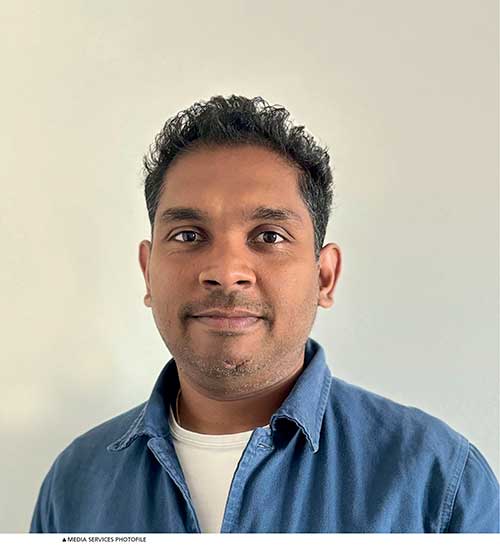Lahiru Gamathige
Problem solving through tech
With programming, you get the feeling that you’re truly building something valuable

Q: What inspired you to work in the tech industry?
A: I decided to take up mathematics for my A-Levels since engineering is the path for creating new things and solving hard problems. From physical buildings to software products, this always fascinated me. Building these products has always seemed quite challenging.
When I was at the University of Moratuwa, we were given a glimpse into every engineering area for a year with two classes in each field that was available to study. Students had to choose an area based on their interests and marks.
During the programming courses, I instantly felt it was what I wanted to do. I loved the deep focus and contemplation that programming requires, and felt this was within my circle of competence. With programming, you get the feeling that you’re truly building something valuable though it is hardly tangible.
Q: How did your experience working in Google Meet’s developer productivity team influence your career path?
A: Most medium to small teams do not think about their developers’ productivity but it provides immense power to organisations. I was surprised to see how many full-time engineers within Google were dedicated to improving the productivity of the rest of them.
This shifted my thinking about the productivity of any process. You need to have a process in place and another one to improve your original process.
That’s how you innovate quickly and also keep low churn among employees; because at the end of the day, they feel more productive and less confused, and fewer mistakes will be made.
Q: And how do you view the tech industry in Sweden in the context of innovation?
A: The Swedish tech industry is very innovative – thanks to free education and healthcare, people can take more risks and try different ideas. So if you do not make money for a short period, you’re not compromising your kids’ education or family’s healthcare.
If you work for an employer for more than a year in Sweden, you have permission to explore your own business for six months; and you’re entitled to employment in the organisation if you decide to return.
This infrastructure makes Swedish society innovate more and solve interesting problems. As a society, Swedes are more forward-thinking and open to trying new technology. In Sweden, people rarely use cash – even at garage sales – and seldom carry it.
Q: Are there any particular facets of Swedish work culture that you find unique or beneficial?
A: Swedish work culture is slow and steady. Companies spend a long time planning, contemplating and reaching a consensus but execution is very quick. This leads to fewer alternatives after execution.
Moreover, Swedish companies plan their work schedule based on the session. In summer, there will be less work and in July, nearly all offices are empty. But these companies make good profits and pursue tech innovation even though they don’t grind all day long for an entire year.
Q: What do you enjoy most about living in Stockholm and working in the tech industry in Sweden’s capital?
A: Stockholm is a very clean city and it’s easy to access the forest. We live five kilometres from the city centre but can access nature with a two minute walk and easily go for a 15 kilometre run in the woods. I enjoy spending time amidst nature and Stockholm is a good place for this.
The city has good public transportation and well-connected bike paths. So you don’t need to own a car.
From the perspective of a tech employee, Stockholm offers many opportunities, and interesting and smart people to work with. But the salary is half of what you could earn in Silicon Valley. On the other hand, Swedish salaries are quite high compared to the rest of Europe.
Q: And finally, what changes or developments do you hope to see in Sri Lanka’s tech industry in the next few years?
A: Digitalisation is barely addressed in Sri Lanka – in the government sector as well as the consumer market. With digital identification issued by the government or banks, I believe that a great deal of innovation can be enabled.
I see some growth in angel investing and also support systems for startups. My hope is that things will continue to grow, and more opportunities will be created and problems solved with technology.
Unfortunately, no climate tech or energy sector technologies are emerging in Sri Lanka or developing countries. Governments should initiate and support innovation in areas like the climate, sustainability and energy.

CV IN A NUTSHELL
Lahiru Gamathige is passionate about solving impactful problems in society by leveraging technology. He worked in the tech industry for 15 years across three countries – including Silicon Valley in the US – between 2018 and 2022 prior to relocating to Sweden.
During the course of his career, Gamathige has worked in small startups and large organisations such as Google as an engineer. These days, he is exploring a new venture of his own, which is presently in stealth mode.
FACT FILE
FAMILY
Wife – Lasitha De Silva
Five-year-old daughter – Surali Ginnaliya
SCHOOLING
Mahinda College
HIGHER EDUCATION
Master’s in computer science – Indiana University
BSc in computer engineering – University of Moratuwa
PRESENT OCCUPATION
Tech founder
COUNTRY OF RESIDENCE
Sweden
CITY OF RESIDENCE
Stockholm
